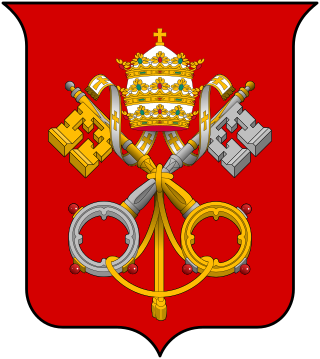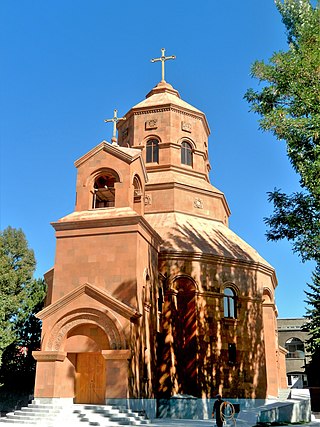Related Research Articles
Personal prelature is a canonical structure of the Catholic Church which comprises a prelate, clergy and laity who undertake specific pastoral activities. The first personal prelature is Opus Dei. Personal prelatures, similar to dioceses and military ordinariates, are under the governance of the Vatican's Congregation for Bishops. Since 4 August 2022, personal prelatures have instead been governed under the Dicastery for the Clergy. These three types of ecclesiastical structures are composed of lay people served by their own secular clergy and prelate. Unlike dioceses, which cover territories, personal prelatures—like military ordinariates—take charge of persons as regards some objectives regardless of where they live.
The hierarchy of the Catholic Church consists of its bishops, priests, and deacons. In the ecclesiological sense of the term, "hierarchy" strictly means the "holy ordering" of the church, the Body of Christ, so to respect the diversity of gifts and ministries necessary for genuine unity.

The Catholic Church in Bosnia and Herzegovina is a part of the worldwide Catholic Church under the spiritual leadership of the pope in Rome.
The Catholic Church in Gabon is part of the worldwide Catholic Church, under the spiritual leadership of the Pope in Rome. It is endowed with the right to elect its own clergy, except archbishops.

The Catholic Church in Uzbekistan is part of the worldwide Catholic Church, under the spiritual leadership of the Pope in Rome.

The Catholic Church in Turkey is part of the worldwide Catholic Church, under the spiritual leadership of the Pope and the canonical leadership of the curia in Rome that is submitted to the Pope.

The Catholic Church in Tajikistan is part of the worldwide Catholic Church in Tajikistan, under the spiritual leadership of the Pope in Rome.

The Catholic Church in Mongolia is part of the worldwide Catholic Church, under the spiritual leadership of the Pope in Rome.

The Catholic Church in Kazakhstan is part of the worldwide Catholic Church, under the spiritual leadership of the pope in Rome.

The Spiritans is a male religious congregation of the Catholic Church. In continental Europe and the Anglosphere they are known as Spiritans. Members use the postnominals CSSp.

The Diocese of Parañaque is a diocese of the Latin Church of the Catholic Church in Metro Manila, Philippines which encompasses the cities of Parañaque, Las Piñas, and Muntinlupa. Previously belonging to the Archdiocese of Manila, the Ecclesiastical District of Parañaque was declared an independent diocese on December 7, 2002, by Pope John Paul II by virtue of the papal bull Ad Efficacius. The district bishop, Jesse Eugenio Mercado, also one of the auxiliary bishops of Manila, was designated as its first and only bishop and was formally installed on January 28, 2003.

The Congregation of the Blessed Sacrament, commonly known as the Sacramentinos is a Catholic Clerical Religious Congregation of Pontifical Right for men founded by St. Pierre-Julien Eymard. Its members use the nominal letters S.S.S. which is the acronym of its official name in Latin, after their names. By their life and activities, they assist the Church in her efforts to form Christian communities whose center of life is the Eucharist. They commit themselves to the implementation of this ideal in collaboration with lay men and women engaged in various ministries.
In the Catholic Church, a parish is a stable community of the faithful within a particular church, whose pastoral care has been entrusted to a parish priest, under the authority of the diocesan bishop. It is the lowest ecclesiastical subdivision in the Catholic episcopal polity, and the primary constituent unit of a diocese or eparchy. Parishes are extant in both the Latin and Eastern Catholic Churches. In the 1983 Code of Canon Law, parishes are constituted under cc. 515–552, entitled "Parishes, Pastors, and Parochial Vicars."

The Diocese of Rome, also called the Vicariate of Rome, is the ecclesiastical district under the direct jurisdiction of the Pope, who is Bishop of Rome and hence the supreme pontiff and head of the worldwide Catholic Church. As the Holy See, the papacy is a sovereign entity with diplomatic relations, and civil jurisdiction over the Vatican City State located geographically within Rome. The Diocese of Rome is the metropolitan diocese of the Province of Rome, an ecclesiastical province in Italy. The first bishop of Rome was Saint Peter in the first century. The incumbent since 13 March 2013 is Pope Francis.
The Roman Catholic Diocese of Banjul is a diocese located in the city of Banjul in the Gambia.
A personal ordinariate for former Anglicans, shortened as personal ordinariate or Anglican ordinariate, is an ordinariate, a canonical structure within the Catholic Church established in order to enable "groups of Anglicans" and Methodists to join the Catholic Church while preserving elements of their liturgical and spiritual patrimony.

Christians in the Gambia constituted Muslim 96.4%, Christian 3.5%, other or none 0.1%.

The Italo-Albanian Catholic Church or Italo-Albanian Byzantine-Catholic Church is one of the 23 Eastern Catholic Churches which, together with the Latin Church, compose the Catholic Church. It is an autonomous (sui juris) particular church in full communion with the Pope of Rome, directly subject to the Roman Congregation for the Oriental Churches, but which follows the Byzantine Rite, the ritual and spiritual traditions that are common in most of the Eastern Orthodox Church. It uses two liturgical languages: Koine Greek, the traditional language of the Eastern Churches, and Albanian, the native language of most of its adherents.

The Armenian Catholic Ordinariate of Eastern Europe is an Ordinariate (quasi-diocese) of the Armenian Catholic Church for its faithful in certain Eastern European ex-Soviet countries without proper Ordinary for their particular church sui iuris.
Bishop Michael Joseph Moloney C.S.Sp. was an Irish born priest of the Holy Ghost Fathers, also known as Spiritans. He served as Bishop of Bathurst in Gambia for 42 of his 54 years as a priest and bishop. He was created Commander of the Order of the British Empire (CBE) about 1951.
References
- ↑ The ARDA website, retrieved 2023-08-03
- 1 2 Dampha, Ebrima (2014-08-14). "The Feast Of Sainte Mary - The Gambia | Standard News From The Gambia" . Retrieved 2022-12-30.
- ↑ "Banjul Diocese List of Parishes". 2019. Retrieved May 18, 2023.
- ↑ "Banjul Diocese Priest Directory". 2018. Retrieved May 18, 2023.
- ↑ US Department of State. "Gambia 2020 International Religious Freedom Report" (PDF). Retrieved May 18, 2023.